Are you striving for the success of your digital marketing organization? Remember, it’s not just about putting in the effort; you also require effective guidance to propel it to great heights.
Inadequate marketing agreements can result in no positive outcomes, reduced profits, and a range of potential hazards for your agency. A robust and foolproof contract safeguards your business, organization, and clients.
This guide will offer top-notch strategies that are guaranteed to assist you in mitigating these risks and establishing a strong contract foundation.
Essential Components of a Digital Marketing Contract
Here are some critical elements to consider before finalizing any client contract.
A Clear Vision of Your Objectives
A well-defined set of objectives lays the foundation of a robust client contract. You can safeguard your agency from potential threats by preventing potential misunderstandings.
An effective contract should include all pertinent details. Make sure to incorporate all relevant information to paint a clear and comprehensive picture of the agreement.
Deliverables and Time Schedule
Outlining a schedule is imperative in a contract, especially based on a project. On the other hand, if your services involve deliveries, it’s equally vital to establish a timeline for those.
Moreover, including a timeline holds individuals accountable for accomplishing tasks within specified timeframes. Adhering to these timelines contributes to the successful attainment of goals.
Terms of Compensation and Payments
Before starting work with a client, clearly defining the compensation and payment terms within the contract is essential. This approach ensures that the client assumes responsibility for payment.
You decide whether the client pays a portion up front and the balance after delivery or chooses monthly payments. Stipulating consequences for late payments, including potential contract termination, is crucial.
Validity of the Agreement
The validity of a digital marketing contract is critical, as it legally binds both parties to the agreed terms. Additionally, incorporating a signature design lends the contract authenticity and professionalism.
Besides improving the contract’s visual appeal, a signature streamlines the overall process, instilling a sense of accountability between the involved parties.
The Rights
Clearly defining who will be granted access to your contract and who will not is crucial. This may include patents, trademarks, copyrights, and proprietary business information.
Implementing this measure will allow you to effectively curtail access to only genuine individuals effectively, fostering legal collaboration. Moreover, it serves as a safeguard for the comprehensive protection of your contract.
Insurance and Liability
Incorporating an indemnity clause delineates the extent of risk each party is willing to undertake, providing legal safeguarding for both sides. A limited liability clause should also be included, constraining the financial liability of each party should the business contract lead to damages.
The Termination
It is essential to incorporate clear termination policies to guide the transition from the contract to the primary task. This is particularly crucial as client intentions and directions can shift unexpectedly.
The contract should clearly define the procedures for ending the business relationship with the other party. Specify how far before the termination must be demanded, the acceptable methods for requesting termination (email, registered letter, etc.), and the process for canceling the agreement.

The Best Practices for an Effective Digital Marketing Contract
When crafting a contract for marketing services, it is essential to keep the following key objectives in mind:
Design Your Contract According to the Client’s Need
Develop a contract that precisely defines the how, why, when, and what of your services for the customer. Clearly describe each service, including payment and privacy conditions. Avoid blanket statements, as the contract serves as the safeguard for your company.
Legal Advice and Consultation
Locate and consult with a qualified solicitor about your marketing deal. Legal experts understand legal terminology – they are adept at articulating the critical clauses and provisions that protect both parties. Furthermore, they can assist you in avoiding mistakes that could expose your organization to risk.
Review the Contract Occasionally
A digital marketing contract holds legal validity, but this validity is time-bound. Service modifications, pricing adjustments, and other developments might need updates. Flexibility should be maintained to allow you or the client to modify contract elements as required.
Contract amendments can be made at specific junctures, subject to mutual agreement. Altering the terms of an agreement typically mandates prior written consent from both parties. In some cases, terminating the existing agreement and establishing a new one might be more efficient.
Create Conflicts Resolution Methods
One of the most critical functions of an agreement is to provide a framework for resolving disputes. Conflicts are an undesirable part of business interactions. When such situations arise, a well-structured service contract is invaluable for both parties to address and navigate the issue.
Bottom Line
An effective and robust digital marketing contract is more than just a legal formality; it ensures the smooth progression of the entire project. The elements and best practices discussed above are instrumental in crafting a strong agreement that adheres to legal mandates and facilitates seamless collaboration. Following these guidelines ensures that both parties abide by the contract’s stipulations and constraints.





